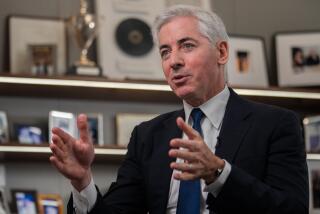The Truth, the Whole Truth and Nothing but . . .
Here’s the dilemma: The co-founder and chairman of a financial services company commits suicide, revealing after his death a series of fraudulent transactions.
Clients, of course, stand to be hurt. The media, of course, finds out about some of the fraud from sources outside the company and calls for confirmation and comment. The company, of course, is in a quandary. What the heck do we do now?
The ethical answer, says public relations consultant Hatti Hamlin, is simple and forms the basis of most successful corporate crisis management: Tell the truth. Tell it fast. Get it over with. Move on. Then talk about how you’re moving on.
The practical answer, compliments of the company’s lawyers, is nothing, nada, stony silence.
And the actual answer to this actual conundrum, which played out in San Francisco several years ago? The lawyers won. The company stayed mum, struggled along in silence, and very nearly went out of business in the process.
“There were a number of disputes between myself and the lawyer [who] represented them about the extent of disclosure, about even confirming information the media had gotten elsewhere,” says Hamlin, who represented the company at the time. “I felt strongly that the company’s credibility would have been enhanced by cooperating with the media.”
To fess up or not to fess up, that is the question facing corporate America nearly every day at the end of the tell-all 20th century. These days, the media and its consumers behave as if all information is fair game. It isn’t, but there are very few givens when it comes to corporate disclosure of information.
On the one hand, the Securities and Exchange Commission, for example, requires that certain financial facts be made public by public companies. On the other, no one in her right mind would reveal certain trade secrets: the recipe for Coca-Cola, the earliest plans for a new computer product.
Between those two certainties, however, lies most of the rest of corporate life. And watching executives pick their way through the ethical minefields of disclosure is a fickle public increasingly willing to punish companies that make public missteps.
Complicating that already delicate journey for most business executives are “the tensions between fiduciary responsibility and the responsibility of being ethical human beings,” says William F. Woo, former editor of the St. Louis Post Dispatch.
Hamlin, senior vice president and general manager at EvansGroup Public Relations in San Francisco, sees “legitimate reasons why business executives face dilemmas in doing the right thing. Sometimes the right thing for shareholders is different from the right thing for customers or people in the community.”
Balancing that tension is not impossible, but companies often err on the side of silence, and the result can be disaster.
“Some of the biggest problems that companies get themselves into is their failure to give timely disclosure of information that the public has a need or a serious interest in receiving,” says Woo, who now teaches journalism at UC Berkeley and Stanford University.
“An honest and forthright explanation saves you lots of trouble down the road of having to go over, correct or modify a story,” he says. “Nothing is more damaging to credibility than the retraction or modification of a story.”
Woo only had to pick up his local paper this week to find an example of such a misstep. Over the summer, the paper had reported that a local market was in the process of being sold, leaving the neighborhood without a grocery store.
Local residents were in an uproar, and the market denied the story. Fast forward almost four months, after rampant rumors but no disclosure. Last weekend, dumbfounded workers were told that the grocery will close once all merchandise is sold.
The paper reported that a video store will start construction on the site before the end of the year. To Woo, the grocery company broke the first rule of public relations: Never lie to the news media.
Sam Singer, a principal in the San Francisco communications firm of Kamer-Singer & Associates, states that rule even more strongly.
“Never lie even when you think you can get away with it,” he says. “If you’re caught, and you likely will be, you’ll become a bad source of information and a useless spokesperson or conveyor of a point of view.”
Singer likes to point to a 1989 televised interview with Lawrence Rawl, chairman and chief executive of Exxon, as a classic example of bad disclosure. Rawl was interviewed on CBS after the Exxon Valdez oil spill off the coast of Alaska.
The company’s cleanup plan for the ecological disaster had just been submitted to the government, and Rawl was asked for details. Not only was he not informed and not forthcoming, but he was combative and patronizing.
“Why aren’t you familiar with the plan?” Rawl was asked. “It’s just been completed,” he responded. “Obviously, there’s been some misunderstanding of what the chairman of a worldwide company does. One thing you don’t do is read every technical plan.”
Ouch. Eight years later, Singer is still dumbfounded. “He’s the head of a company and he doesn’t know what a report says?” asks an incredulous Singer. “When you see that, you’ll see why it’s used in every media training in America.”
There are, of course, times when the most prudent decision is not to comment. Hamlin has a few guidelines. If the facts of a situation are in dispute, she says, it is ethical to delay disclosure until the facts are better known. Personal lives of employees are out of bounds, unless their behavior directly affects the operation of the company.
“And I think there are reasons not to disclose something where it will harm the company’s ability to survive and where the underlying issue is not one to harm the public good,” Hamlin says.
One way for companies to behave more ethically when they make decisions about disclosing information to the public or keeping silent is to plan for the worst-case public relations scenarios in advance.
“Do all the ‘what ifs’ in advance,” Hamlin advises her clients. “What if the boss is accused of sexual harassment? What if the CFO absconds with $1 million? What if the milk we use is bad and 25 people get sick in Peoria? How do we respond? Hammer out the responses and get the lawyers involved.”
More to Read
Inside the business of entertainment
The Wide Shot brings you news, analysis and insights on everything from streaming wars to production — and what it all means for the future.
You may occasionally receive promotional content from the Los Angeles Times.











